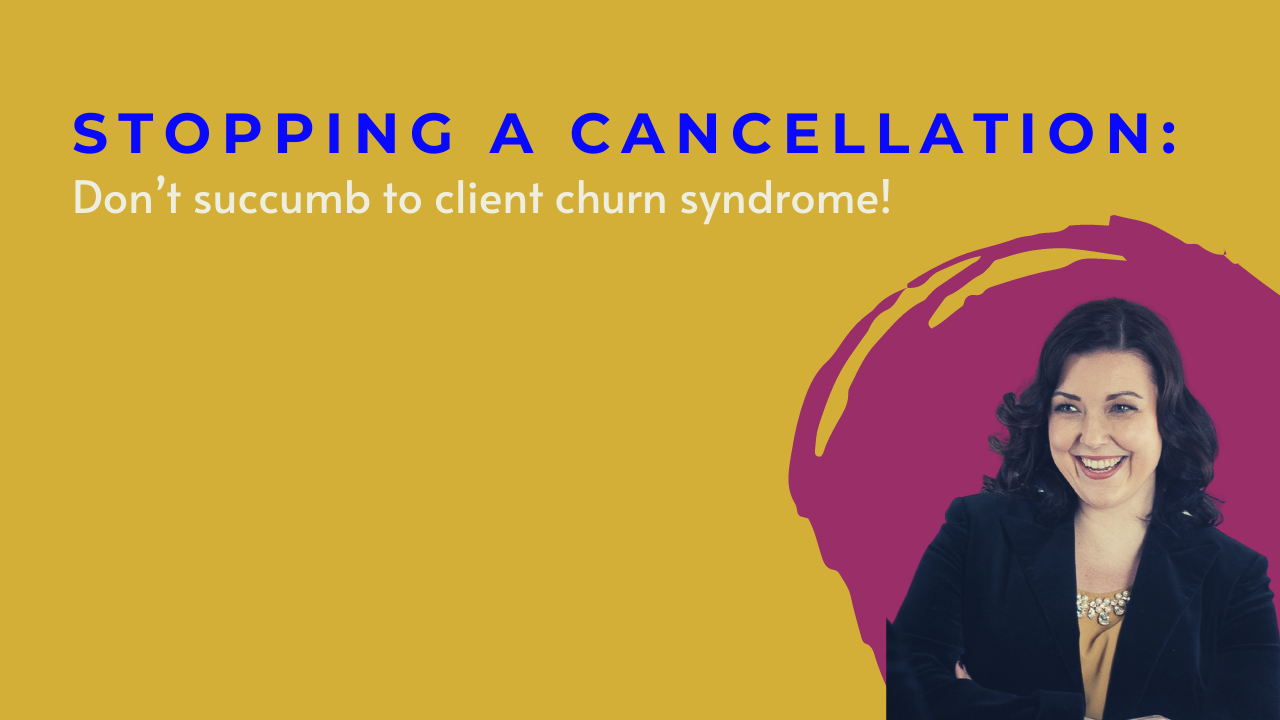Once a client has made up their mind, is stopping a cancellation even possible? Yes! We talk about why cancellations happen, when and how you can intercede to put the brakes on, and why agencies should implement a process to improve their insurance agency’s retention and a system to minimize cancellations.
It’s happened to all of us. We pick up the phone and one of our longtime clients is canceling their auto insurance. Or their home insurance. Or their business coverage. Or perhaps even their whole account, encompassing all those policies, and more.
This takes you by surprise. You probe for what prompted this decision. Was there a life change? Or something that the client was dissatisfied with?
You’ve probably heard all the reasons many times before. Often, it’s price. The client just saved hundreds of dollars on a tip from their brother-in-law. Or maybe they didn’t like the way the insurance company handled a recent claim. Or perhaps they were attracted to some shiny, new object – an insurance promo, a discount, a feature, or a sales line they saw on a TV ad. Or maybe they just got a new protection that makes them feel more secure – an umbrella or a cyber policy – and they lost confidence in you because you weren’t the one to suggest it. You poke around a bit to see if you can change their mind, but they seem firm about their decision.
You chalk it up. A certain amount of customer churn is to be expected, right?
Wrong. Customer churn is not inevitable. Losing a percentage of customers every year is not some immutable fact of life. Your cancellation rate is something you can and should work to minimize to a negligible level. You absolutely can improve your insurance agency’s retention!
Even when learning about a cancellation at late stage — when the proverbial horse is just about to get out of barn door – a cancellation can often be deterred, and the relationship salvaged if you’ve trained and planned for how to handle such an event.
And the real question may be not why the client is canceling, but why you are only finding out about it now.
Improve Insurance Agency Retention: Preventing Cancellations
Preventing a cancellation is far easier than trying to save a client’s business once they’ve made the decision to switch to a new agency or to a direct writer. It’s also much less costly. Most of the costs for acquiring a customer are front-loaded in the form of your sales staff, your marketing expenses, your promotions, your website, plus the time invested in acquiring and onboarding that customer.
Noted consultant Bain & Company illustrated the costs in a landmark study on customer acquisition and retention, conducted in coordination with Harvard Business School. Despite the study having been conducted a few decades ago, it’s still a business school classic and still often cited for its truth:
“We showed that in industry after industry, the high cost of acquiring customers renders many customer relationships unprofitable during their early years. Only in later years, when the cost of serving loyal customers falls and the volume of their purchases rises, do relationships generate big returns. The bottom line: increasing customer retention rates by 5% increases profits by 25% to 95%.”
Bain’s point rings true in the insurance agency business. Often in a low-margin business, the first year with a customer nets out on balance with the acquisition cost and it isn’t until later years when the true value of the customer is derived. Profitability comes when you deepen the relationship with renewals. A good relationship has the potential to yield additional benefits. Happy clients buy additional products. They talk favorably about their experience and make referrals to family and friends.
Yet despite the potential benefits of insurance agency retention versus the risk of loss, agencies often shortchange a customer once they are acquired rather than investing the time and service to stay in touch and check in to keep the relationship going and to engage with your customers to reduce turnover.
Could your insurance agency increase retention rates by 5%? Make it a goal.
Establish a “Zero Churn” Agency Culture!
Preventing a cancellation starts on the first day that you onboard a new client and continues through the entire policy cycle. Insurance agency retention shouldn’t be left to chance, it should be a measured agency discipline, a process. Many companies have a vice president of marketing or a vice president of sales. Fewer have senior positions devoted to retention.
The concept of establishing a culture of zero churn is an adaptation of the “zero defect” quality initiative which gained traction in global manufacturing. Zero defect was aimed at eliminating failures and deficiencies in systems and processes rather than finger-pointing at employees. Zero churn may seem impossible as a goal for your agency, there are factors totally beyond your control – a client may move, or die, or simply be adamant about making a change. But as an aspirational philosophy or an agency culture, a zero-churn approach is a worthy target. Aiming to “do it right” the first time when it comes to customer satisfaction is never a wrong thing.
Do you know what your cancellation rate is now? Do you have quantifiable history of what the cancellation reasons have been? Ideally, you are tracking all the reasons why customers have left and using that data to understand how to improve performance. Are there patterns in the reasons why clients leave? Do cancellations coincide with rate hikes? Are your competitors offering new products or services, or simply making it easier to do business using digital tools?
It doesn’t matter if you think you are providing superlative service, a high level of insurance expertise, and strong value to your client – it’s what they think and what their perceptions are that matters. Do they value you? Have you asked them what value you bring or what they think of the services you provide?
How often do you reach out to your clients? Here’s a quick pop quiz:
- Did you reach out to your clients over the pandemic lockdown?
- Do you follow them and engage with them on social media?
- Do you have their preferred communication method and time on file?
- Do you personalize your communications?
- How do you keep them engaged? How do you nurture the relationship? Do you check in with them regularly?
- Do you keep clients apprised of product changes, new technologies, risk reduction tips, and rate increases on the horizon? Nobody likes to talk about rate increases, but far better to learn from you and discuss options than to be surprised.
- Do you send them upcoming renewal notices?
- Do you conduct satisfaction surveys? Do you offer ways for them to give feedback?
- Do you send text or email birthday greetings?
- What have you done to share your expertise in the past year?
- What have you done to delight your client in the last year?
- Have you thanked your client lately?
If you struggle with these questions, you need to work on engagement and your insurance agency’s retention strategy!
But before you embark on a “zero churn” approach, you might want to analyze your book. If your book is heavily loaded down with monoline clients, you are vulnerable and that’s the place to start. Every one of those clients is a cancellation waiting to happen. You can and should address that. Upsell, cross sell, and account round. It’s rather self-defeating to put a full-court press on deepening a relationship with a single product client. It’s hard to show your value on such a thin basis.
Handling the dread cancellation call
You can save a game in the ninth inning, even when coming from behind, but you need a strategy. You need to understand and prepare for common reasons why a client cancels their insurance. If you are prepared, the call is something you no longer need to dread. Think of it this way: if a client values you enough to call in to cancel, they are positively inviting you to give them a reason to stay.
you get that call, be sure to find out why so that you can potentially track and counter the reason. Some of the most common reasons include:
- Price / saving money.
- Poor service experience. Often, this is with claim processing from the insurer.
- Life/asset changes.
- Non-payment. This is generally happening to them, not by them.
- Moving to another part of the state or the country.
- New, shiny object syndrome, attracted by a perk, an ad, or a family/friend story.
Almost every one of these reasons could have been prevented on the front end, but now that you are on the back end, you must try to counter and retain their business, if possible.
For each cancellation reason, plan a strategy, script a call, and train so you are ready to roll. If you get a cancellation call for price, put your best, most experienced producer on the line and try to find a better deal than the one they have real-time to retain them. If you can’t do it real-time, make it a top priority to get back to them same day with the most attractive offer you can find.
If your client is adamant, offer to do a no-cost, no-strings review/analysis of their new coverage to be sure that there are no gaps or exposures, and to ensure they are not losing anything with the savings they are getting.
If your best, most diligent efforts don’t succeed in keeping the client, be sure to keep the relationship on a good and gracious footing. Let your client know that you want to keep in touch and that they are always welcomed to come back if they are not satisfied with the change. Tell them you will keep them informed and would like to re-earn their business.
Winning clients back
No matter what reason the client gave you for leaving, you should think of it a failure to communicate. Even if you communicated with the client frequently, communication is a two-way street. The message may have been sent, but was it received? If you get a surprise cancellation call, then the client did not fully understand the value that you bring and the lengths you will go to satisfy and serve them – it’s as simple as that!
Don’t beat yourself up, but starting today, change your mindset. There are no “lost” clients, reframe that as “familiar” leads. Most leads and prospects are new to us, a blank slate, but with former clients, we know them, we know why they left, and we know their renewal dates. That means we are armed with exceptionally valuable insight to win them back! And if they left for price, you know they will be amenable when rates increase, as they inevitably do.
Whenever a client cancels, set the stage for a healthy, ongoing relationship. Sometimes clients who cancel feel reluctant or sheepish, but let them know it is business, not personal and that you want to keep the relationship open to help them with any future needs they may have. Then, your mission is to communicate through a targeted nurturing campaign designed to win them back. You want to reach out at least quarterly with holiday greetings, seasonal risk mitigation tips, or product/service news that might be of interest. If you are comfortable with a higher contact frequency and you have compelling content, reach out more often.
At about 60 days prior to renewal, up your communication frequency with a targeted series of emails, texts, voice mails, and phone calls reminding them that you would be happy to quote their business again to ensure they get the best deal and the best coverage. Make them feel comfortable in coming back to you, that the door is always open.
Don’t leave this process up to individual service staff and producers to invent. Create scripts, timelines, and tools, and train to the process. And don’t be discouraged or drop the ball if you are not successful in your first effort to win your client back – be persistent. It can sometimes take a few years. Be a friendly and a helpful resource to your “familiar” lead so that they feel comfortable in tapping into your expertise and returning home to your agency when they are ready.
How to Set Up a Process to Stop Insurance Cancellations the Easy Way
If everything we’ve talked about sounds nice to have but in the “when will our agency ever get around to building it” category, we’ve got you covered. If you want an insurance agency plan for handling inbound and outbound insurance cancellation calls, with our Agency Process Pack — Reducing Cancellations – you’ve got it. Find templates, videos, and the sample scripts your agency needs to handle those dread cancellation calls.
What’s included in the Reducing Cancellations Process Pack?
- Mini E-course with best practices.
- Workbook on how to stop a cancellation.
- Types of cancellations & how to track them.
- 2 hours of short, 5-minute videos.
- Process templates, checklists, and workbooks.
- Handling late payment cancellation risks.
- Saving call-in cancellation scripts.
- Calling out to lost customers – process, scripts, survey.
- How to win lost clients back, with lead nurturing ideas, a win-back timeline, and templates.
Check out our other Agency Process Packs.
Other helpful resources:





